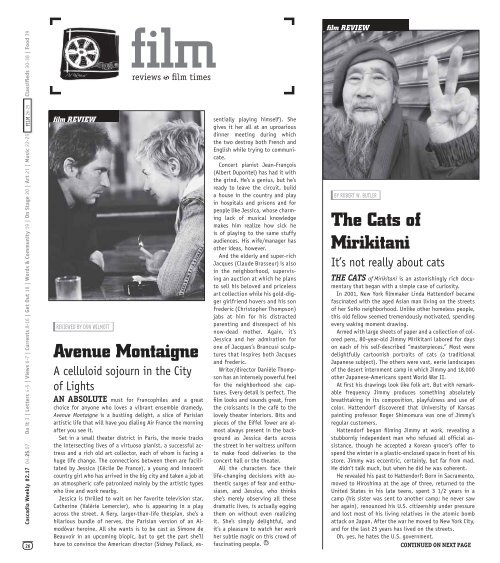Apr 24 - May 1 - Cascadia Weekly
Apr 24 - May 1 - Cascadia Weekly
Apr 24 - May 1 - Cascadia Weekly
You also want an ePaper? Increase the reach of your titles
YUMPU automatically turns print PDFs into web optimized ePapers that Google loves.
<strong>Cascadia</strong> <strong>Weekly</strong> #2.17 04.25.07 Do it 3 | Letters 4-5 | Views 6-7 | Currents 8-16 | Get Out 18 | Words & Community 19 | On Stage 20 | Art 21 | Music 22-25 | Film FILM 26-29 | Classifi eds 30-38 | Food 39<br />
26<br />
fi lm REVIEW<br />
REVIEWED BY DON WILMOTT<br />
fi lm<br />
reviews fi lm times<br />
Avenue Montaigne<br />
A celluloid sojourn in the City<br />
of Lights<br />
AN ABSOLUTE must for Francophiles and a great<br />
choice for anyone who loves a vibrant ensemble dramedy,<br />
Avenue Montaigne is a bustling delight, a slice of Parisian<br />
artistic life that will have you dialing Air France the morning<br />
after you see it.<br />
Set in a small theater district in Paris, the movie tracks<br />
the intersecting lives of a virtuoso pianist, a successful actress<br />
and a rich old art collector, each of whom is facing a<br />
huge life change. The connections between them are facilitated<br />
by Jessica (Cécile De France), a young and innocent<br />
country girl who has arrived in the big city and taken a job at<br />
an atmospheric cafe patronized mainly by the artistic types<br />
who live and work nearby.<br />
Jessica is thrilled to wait on her favorite television star,<br />
Catherine (Valérie Lemercier), who is appearing in a play<br />
across the street. A fi ery, larger-than-life thespian, she’s a<br />
hilarious bundle of nerves, the Parisian version of an Almodóvar<br />
heroine. All she wants is to be cast as Simone de<br />
Beauvoir in an upcoming biopic, but to get the part she’ll<br />
have to convince the American director (Sidney Pollack, es-<br />
sentially playing himself). She<br />
gives it her all at an uproarious<br />
dinner meeting during which<br />
the two destroy both French and<br />
English while trying to communicate.<br />
Concert pianist Jean-François<br />
(Albert Dupontel) has had it with<br />
the grind. He’s a genius, but he’s<br />
ready to leave the circuit, build<br />
a house in the country and play<br />
in hospitals and prisons and for<br />
people like Jessica, whose charming<br />
lack of musical knowledge<br />
makes him realize how sick he<br />
is of playing to the same stuffy<br />
audiences. His wife/manager has<br />
other ideas, however.<br />
And the elderly and super-rich<br />
Jacques (Claude Brasseur) is also<br />
in the neighborhood, supervising<br />
an auction at which he plans<br />
to sell his beloved and priceless<br />
art collection while his gold-digger<br />
girlfriend hovers and his son<br />
Frederic (Christopher Thompson)<br />
jabs at him for his distracted<br />
parenting and disrespect of his<br />
now-dead mother. Again, it’s<br />
Jessica and her admiration for<br />
one of Jacques’s Brancusi sculptures<br />
that inspires both Jacques<br />
and Frederic.<br />
Writer/director Danièle Thompson<br />
has an intensely powerful feel<br />
for the neighborhood she captures.<br />
Every detail is perfect. The<br />
fi lm looks and sounds great, from<br />
the croissants in the café to the<br />
lovely theater interiors. Bits and<br />
pieces of the Eiffel Tower are almost<br />
always present in the background<br />
as Jessica darts across<br />
the street in her waitress uniform<br />
to make food deliveries to the<br />
concert hall or the theater.<br />
All the characters face their<br />
life-changing decisions with authentic<br />
surges of fear and enthusiasm,<br />
and Jessica, who thinks<br />
she’s merely observing all these<br />
dramatic lives, is actually egging<br />
them on without even realizing<br />
it. She’s simply delightful, and<br />
it’s a pleasure to watch her work<br />
her subtle magic on this crowd of<br />
fascinating people.<br />
fi lm REVIEW<br />
BY ROBERT W. BUTLER<br />
The Cats of<br />
Mirikitani<br />
It’s not really about cats<br />
THE CATS of Mirikitani is an astonishingly rich documentary<br />
that began with a simple case of curiosity.<br />
In 2001, New York fi lmmaker Linda Hattendorf became<br />
fascinated with the aged Asian man living on the streets<br />
of her SoHo neighborhood. Unlike other homeless people,<br />
this old fellow seemed tremendously motivated, spending<br />
every waking moment drawing.<br />
Armed with large sheets of paper and a collection of colored<br />
pens, 80-year-old Jimmy Mirikitani labored for days<br />
on each of his self-described “masterpieces.” Most were<br />
delightfully cartoonish portraits of cats (a traditional<br />
Japanese subject). The others were vast, eerie landscapes<br />
of the desert internment camp in which Jimmy and 18,000<br />
other Japanese-Americans spent World War II.<br />
At fi rst his drawings look like folk art. But with remarkable<br />
frequency Jimmy produces something absolutely<br />
breathtaking in its composition, playfulness and use of<br />
color. Hattendorf discovered that University of Kansas<br />
painting professor Roger Shimomura was one of Jimmy’s<br />
regular customers.<br />
Hattendorf began fi lming Jimmy at work, revealing a<br />
stubbornly independent man who refused all offi cial assistance,<br />
though he accepted a Korean grocer’s offer to<br />
spend the winter in a plastic-enclosed space in front of his<br />
store. Jimmy was eccentric, certainly, but far from mad.<br />
He didn’t talk much, but when he did he was coherent.<br />
He revealed his past to Hattendorf: Born in Sacramento,<br />
moved to Hiroshima at the age of three, returned to the<br />
United States in his late teens, spent 3 1/2 years in a<br />
camp (his sister was sent to another camp; he never saw<br />
her again), renounced his U.S. citizenship under pressure<br />
and lost most of his living relatives in the atomic bomb<br />
attack on Japan. After the war he moved to New York City,<br />
and for the last 25 years has lived on the streets.<br />
Oh, yes, he hates the U.S. government.<br />
CONTINUED ON NEXT PAGE








